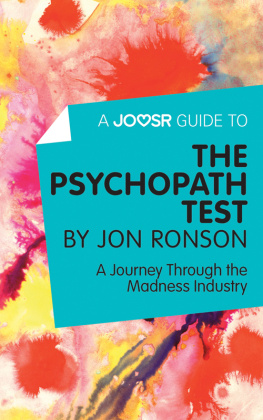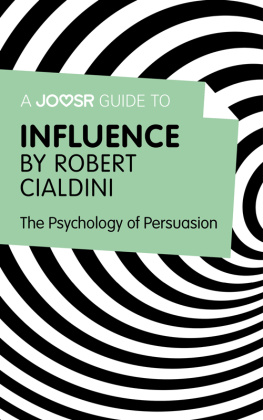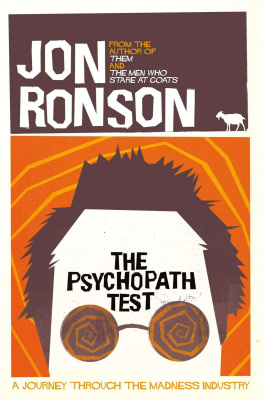THE PSYCHOPATH TEST
BY JON RONSON
A Journey Through the Madness Industry

Whats it about?
Weve all had that moment when we observe someone behaving in such a strange, callous or dangerous way that the word psycho passes through our mind. Sometimes, we use this label somewhat in jest simply because theyre behaving in a way we dont understand.
At other times, though, the label of psychopath is used to aptly describe someone who shows no concern or empathy towards others. Often, we are describing someone who displays criminal psychopathic behavior. The criminal psychopath behaves in a way that others wouldnt even considernot even other criminals. Their crimes, and subsequent actions and attitude, leave us with chills running down our spines.
The Psychopath Test: A Journey Through the Madness Industry asks the question: Are all psychopaths the same? Some psychiatric professionals seem to think so, having gone so far as to create a questionnaire that helps everyday people, as well as mental health professionals, to profile those around them. They propose that there are more psychopaths around us than we realize, and that we might not recognize them because they arent necessarily committing heinous crimes.
Others, however, arent so sure about the one-size-fits-all concept of psychopathy. They believe that the mind and personality are far too complex for us to attempt to use one checklist of behaviors to try and describe every psychopath.
Journalist and author Jon Ronson explores this topic in depth, traveling to the United States and Sweden, as well as throughout his home country of England, to interview the top psychological and psychiatric practitioners in the field. What is revealed to him has him questioning his own mental health, profiling those he comes into contact with, and finally going so far as to question the fundamental validity of the so-called Psychopath Test.
Criminal psychopaths seem terrifying and are the type were most familiar with
Ask anyone to name a psychopath and nearly everyone will come up with the name of some well-known criminal. Most psychopaths that are portrayed in film and books are of the criminal variety, so it makes sense that these are the people who first come to mind. The crimes that these people have committed are so horrendous that they are notorious the world over, not just in the town or country where the crimes were committed.
Criminal psychopaths rarely commit crimes of passion. The psychopathic crime tends to be cold and calculated. While the crime is being committed, there is neither fear nor a sense of empathy for the victim. After the crime, remorse is never felt by the perpetrator, let alone displayed.
Such actions and attitudes are so foreign to most people that these kinds of criminals tend to become the very definition of psychopath. But in actual fact, such a limited perception couldnt be further from the truth. Psychological researchers estimate that as much as 1 percent of the population consists of psychopaths. While 1 percent seems relatively small, in a world population of over 7 billion people, that 1 percent represents millions of people who could be classified as having psychopathic tendencies.
These researchers go on to claim that the majority of that 1 percent group of psychopaths does not just consist of the scary, criminal psychopaths weve become so accustomed to hearing about. Rather, the majority of them exist among us in a more mundane existenceoften, according to researchers, in leadership roles.
More psychopaths than we think are living and working right beside us. They may not have criminal tendencies, but most do share some similar qualities that we should be aware of. In order to understand the psychopath next to us, we must get away from any preconceived notions we have of them based on the few criminal psychopaths who make headlines.
Psychopaths in leadership roles can be just as formidable as criminal psychopaths
The idea that the person standing next to you is a psychopath might seem preposterous. Theyre so charming, you argue, There is no way they could be in the same class as rapists and murderers. In actual fact, charm and charisma are the very traits that most psychopaths have in common. They possess a magnetism that draws people in, making it easier for them to accomplish their goal, whether that is to kill their victim or use them to get ahead in their career.
Common characteristics of those in leadership roles include intense drive, a grandiose sense of self, and displaying callous disregard toward the feelings of others.
A classic example of someone who displays these characteristics is former Sunbeam CEO Al Dunlap. To victims of Dunlaps actions, the idea that he could be a psychopath wouldnt be surprising. Dunlap was hired by Sunbeam to fire people. He loved his job, performed it with gusto, and had no empathy toward those he sacked. Instead, he looked at them with distain and called them losers. Dunlap fired hundreds of people and closed many manufacturing plants, turning once-vibrant communities into ghost towns.
When Jon Ronson suggested to Dunlap that his behavior could be classed as psychopathic, Dunlap wasnt convinced. Ronson pointed out that the tendency toward a grandiose sense of self was consistent with psychopathy, to which Dunlap responded, If you dont believe in yourself, nobody else will. When the word manipulative was mentioned, Dunlap argued that manipulation is leadership. As far as feeling no remorse toward those he fired, he explained that a lack of remorse frees a person so that they can move forward and achieve more great things.
While corporate or political psychopaths may not commit crimes, they still have victims. They live in a world made up of predators and prey. Criminals use this spirit to physically harm their prey, while corporate psychopaths use it to get ahead in their careers, giving no heed to those they crush on the way to the top.
Always be observant of those around you, especially those intent on making it to the top no matter what. How do they treat you? If you notice that youre constantly being used, you could very well be in the company of a psychopath. Just because a psychopath isnt a criminal doesnt mean they cant adversely affect you. Those with psychopathic tendencies are master manipulators, and such people can easily negatively impact you and your life.
The Psychopath Testa checklist that can be helpful or harmful
Knowing that there are psychopaths in our midst can be intimidating, even alarming. That is just one reason why Bob Hare, considered by those in the psychological community to be the father of modern psychopathic research, created his Psychopathy Checklist (PCL). The idea is that psychologists, psychiatrists, and even everyday people can discern whether theyre dealing with a true psychopath by referring to this checklist.
When we consider the predatory natureand, at times, extremely violent criminal tendenciesof psychopaths, the idea that a checklist might enable us to identify them as such seems like a very positive thing. The problem with such a checklist, though, is that people think they know definitively when theyre in the company of a psychopath. This can result in discrimination at the very least, and at worst it can result in devastating consequences, such as wrongful imprisonment in a mental institution.
This was the case with a man named Tony who faked insanity to avoid prison time for a crime he had committed. Tony was admitted to a criminal mental institution in England, surrounded with mentally ill men who had committed ghastly crimes. After realizing the mistake he had made, Tony tried to convince those in charge that he was, in fact, completely sane. However, the more sane he acted, the more those around him were convinced he was insane, and the longer he was detained in the institution.
Next page










